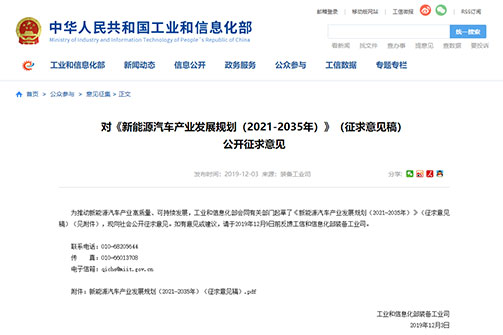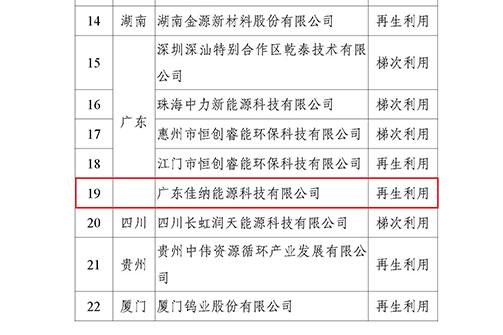Time:2020-06-28Author: Jana Energy
The heads of the Industrial Policy and Regulations Department and the Equipment Industry Department of the Ministry of Industry and Information Technology answered reporters' questions on the decision to modify the "Parallel Management Measures for Average Fuel Consumption and New Energy Vehicle Points of Passenger Car Enterprises"
On June 15th, the Ministry of Industry and Information Technology announced the "Decision on Amending the Parallel Management Measures for Average Fuel Consumption and New Energy Vehicle Credits of Passenger Car Enterprises" (Order No. 53 of the Ministry of Industry and Information Technology) (hereinafter referred to as the "Decision"). Recently, the leaders of the Industrial Policy and Regulations Department and the Equipment Industry Department of the Ministry of Industry and Information Technology answered questions from reporters regarding the "Decision".
ask:
How has the implementation of the "Points Method" been implemented since its release? Why is this revision work being carried out?
Answer: In order to promote energy conservation, emission reduction, and green development in the automotive industry, five departments including our Ministry, the Ministry of Finance, the Ministry of Commerce, the General Administration of Customs, and the General Administration of Quality Inspection, based on the actual needs of China's automotive industry development and fully drawing on foreign management experience, issued the "Parallel Management Measures for Average Fuel Consumption and New Energy Vehicle Points of Passenger Car Enterprises" (Order No. 44 of the Ministry of Industry and Information Technology) in September 2017 (hereinafter referred to as the "Points Measures"). The essence of the "Points Method" is to establish a point trading mechanism and form a market-oriented mechanism to promote the coordinated development of energy-saving and new energy vehicles. After the release and implementation of the "Points Method", we established a points management platform and organized two points transactions. Industry enterprises generally increased research and development investment, accelerated vehicle launch, and steadily improved product performance and quality. The vitality of market entities was fully stimulated. Through online and offline communication and transactions, we promoted communication and cooperation between enterprises and improved resource allocation efficiency. In 2019, China sold 1.06 million new energy passenger vehicles, ranking first in the world for five consecutive years; The actual average fuel consumption of the industry has reached 5.5 liters per 100 kilometers, a decrease of over 10% compared to 2016. The implementation of the "Points Method" has effectively promoted industry technological innovation and the promotion of new energy vehicle production, and has basically achieved the expected goals.
Currently, a new round of global technological revolution and industrial transformation is flourishing, and the integration of automobiles with energy, transportation, information communication and other fields is accelerating. The internal and external environment faced by China's automobile industry development is undergoing profound changes. During the implementation of the "Points Method", there are also issues such as the urgent need to update technical standards, insufficient investment by enterprises in energy-saving technologies for fuel vehicles, and imbalanced supply and demand in the points trading market. In order to adapt to the new situation of industrial development, further optimize management mechanisms, and better promote the high-quality development of energy-saving and new energy vehicle industries, we initiated the revision of the "Points Method" in early 2019.
ask:
What is the working process of modifying the "Points Method"?
Answer: Firstly, conduct in-depth investigation and research. On the basis of summarizing the implementation experience of the "Points Method", a research institution was commissioned to conduct special research on the terms that need to be modified, and industry enterprise research was conducted to form a revised draft. The second is to widely solicit opinions from all parties. After four joint release departments, including the Ministry of Commerce, the Ministry of Commerce, the General Administration of Customs, and the State Administration of Market Regulation, they have publicly solicited public opinions twice, solicited opinions in writing from the industrial and information technology authorities of each province (district, city), and reported to the World Trade Organization on WTO/TBT. The third is to carry out the impact assessment of the COVID-19 on the implementation of the Points Method, study and add new relevant provisions, and leave an interface for possible policy adjustment. Fourthly, based on feedback from all parties, our department, together with relevant departments, has improved the revised draft of the "Points Method".
ask:
What is the main basis for determining the proportion of points for new energy vehicles from 2021 to 2023 in the revised "Points Method"?
Answer: According to the requirements of the "Points Method", this revision clarifies the requirements for the points proportion of new energy vehicles from 2021 to 2023, which are 14%, 16%, and 18%, respectively. The proportion of points is calculated based on a comprehensive consideration of the basic balance of positive and negative points in the industry, meeting the fuel consumption standards in the fifth stage, and achieving the established industrial development goals. According to this proportion requirement, it is basically possible to achieve the planning goal of "by 2025, the average fuel consumption of new passenger cars will reach 4.0 liters/100 kilometers, and the proportion of new energy vehicle production and sales will reach 20% of the total number of vehicles". Meanwhile, the positive and negative points market is expected to maintain a slight oversupply from 2021 to 2023, with points prices objectively reflecting market value.
ask:
In addition to the requirements for the 2021-2023 new energy vehicle credit ratio, what are the main contents of the modification of the "Credit Method"? What are the main considerations?
Answer: Firstly, measures have been added to guide the energy-saving of traditional passenger vehicles. In order to guide enterprises to increase investment in energy-saving technology research and development, the "Decision" provides accounting incentives for enterprises that produce/supply low fuel consumption vehicle models when calculating the point compliance value of new energy vehicles. Considering that as the fuel consumption compliance requirements become stricter year by year, the technical difficulty and cost of vehicle models that meet low fuel consumption standards gradually increase. From 2021 to 2023, the accounting incentives for low fuel consumption vehicle models will be gradually increased, transitioning from 0.5 times and 0.3 times to 0.2 times. The second is to improve the flexibility measures for new energy vehicle points. In order to reduce the risk of imbalanced supply and demand of points and ensure the price of points, the Decision establishes a correlation mechanism between the energy-saving level of traditional energy passenger vehicles and the positive points of new energy vehicles carried forward by enterprises. If the fuel consumption of traditional energy passenger vehicles reaches a certain level, the positive points of new energy vehicles can be carried forward at a ratio of 50%. Thirdly, it enriches the recognition conditions for affiliated enterprises. Allowing the transfer of average fuel consumption points between joint ventures under the same foreign parent company, domestic automobile enterprises, and authorized import supply enterprises corresponding to their overseas production enterprises. Fourthly, passenger cars fueled with alcohol ether fuel will be included in the accounting scope, and accounting discounts will be given to models with energy-saving and emission reduction advantages.
ask:
The COVID-19 has had a negative impact on the development of the automobile industry. What are the considerations for the modification of the Points Method?
Answer: The automobile industry is an important pillar industry of the national economy, with a long upstream and downstream industrial chain and a wide range of involvement, which is greatly affected by the epidemic. In response, our department organized industry experts to conduct an assessment and calculation analysis of the impact of the epidemic on the implementation of the "Points Method", and listened to the opinions of major enterprises on possible adjustment measures. Industry experts analyze and believe that the epidemic has local and short-term impacts on the implementation of the "Points Method", mainly reflected in: for 2019 points compliance, due to the decline in revenue and profits of some enterprises affected by the epidemic, there will be increased financial pressure on them to purchase points to achieve compliance; Regarding the compliance of points in 2020, the epidemic has caused some companies to delay the development and launch of low fuel consumption and new energy vehicle models. In 2020, the supply-demand ratio of points will be tightened, the price of points will increase, and the cost of funds for enterprises that need to purchase points to achieve compliance will increase; The impact of the epidemic on points compliance for 2021 and subsequent years is relatively small. Overall, the international epidemic is still continuing to develop and spread, and the relevant policies that have been and will be introduced in China to stabilize the growth of the automotive industry, promote consumption, and support the development of the new energy vehicle industry are gradually playing a role. We will continue to track and evaluate the specific impact of the epidemic on the implementation of the "Points Method" in 2020 and beyond, and need to continue to track and evaluate.
Therefore, this modification has added provisions such as extending the compensation period based on the development of the automotive industry. In the future, relevant adjustment policies will be studied and proposed based on the impact of the epidemic. On the basis of fully listening to the opinions of industry enterprises, they will be released and implemented according to procedures.
ask:
What is the expected impact of the revision of the "Points Method" on the points trading market?
Answer: During the implementation of the "Points Method", there has been a situation where the supply of points exceeds the demand, the price of points is low, and the guidance for the development of the new energy vehicle industry is insufficient. The reasons are various: firstly, there is no requirement for the assessment of the proportion of points for new energy vehicles in 2018 and previous years, and all new energy vehicles produced by the enterprise generate positive points, resulting in a large supply of positive points; Secondly, the industry's technological development has made rapid progress, and the range of vehicle models continues to increase, resulting in a corresponding increase in vehicle model scores. In 2018, the average score of new energy vehicles reached 3.9 points, an increase of about 30% compared to expectations, further increasing the supply of positive points for new energy vehicles; The third reason is that some enterprises consider low price transactions due to cooperation factors such as technology and business. The revision of the "Points Method" fully considers this situation. After its release and implementation, with the mandatory assessment of new energy vehicle points ratio included and fuel consumption requirements further tightened, the oversupply situation in the points market will be significantly improved, and transaction prices will fully reflect market value, stimulating the vitality of the industry's development of energy conservation and new energy vehicles. In this regard, most enterprises have expected that the market-oriented regulatory role of the "Points Method" in promoting energy conservation and the development of the new energy vehicle industry will also be significantly enhanced.


